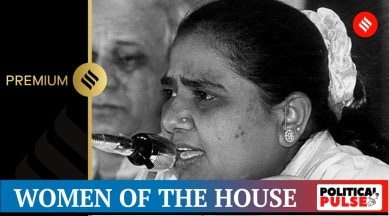Many firsts leading up to UP’s presence among top 5 in women MLAs list
The number of women candidates has been steadily rising; Cong ran a woman-centric campaign last time, and SP has already said it will give 20% of its tickets to women candidates

Top 6 states and a Bottom 1: Why the road to 33% quota for women is very long
In this series, we analyse the factors behind the top six states — Chhattisgarh, West Bengal, Jharkhand, Rajasthan, Uttar Pradesh and Uttarakhand — having the highest women’s representation.
monthly limit of free stories.
with an Express account.
UTTAR Pradesh may lag behind other states on most indices, but not when it comes to the political arena. This applies to even its women. The state has given India its first woman prime minister (Indira Gandhi), the first woman chief minister (Sucheta Kripalani), the first woman Dalit CM (Mayawati), and even the first woman governor (Sarojini Naidu).
While not technically “women” leaders, the effect of their presence at the top seems to have percolated down. With 47 of the 403 MLAs elected in the 2022 elections women (one more won in a bypoll earlier this year), Uttar Pradesh is among the top 5 states in women representation in state Assemblies.
On January 8, while announcing the 2022 poll schedule for five states, then Chief Election Commissioner Sushil Chandra shared that as many as 52 lakh women had been added to Uttar Pradesh’s voter list since 2017, making them about 46.6% of the total.
The number of women MLAs in the state has been steadily rising. In 2007, 23 were elected out of 370 women in the race, the same year as Mayawati came to power heading a majority BSP government. In 2012, when the Samajwadi Party won handsomely, the number of women winners (35) also went up, as did contestants (583). In 2017, even more women won (42), though the number of women contestants fell by more than a 100, to 482.
The 48 women MLAs currently, of the total 559 who contested, include veterans and 22 first-timers. In a House dominated by the BJP, 29 of the women MLAs belong to the party, 4 to its ally Apna Dal (S), 14 to the SP, and 1 to the Congress.
The Congress, whose campaign theme was ‘Ladki hun, lad sakti hun’, fielded 155 women candidates. However, only 1 of them won, with most of them losing their deposits. The BJP fielded 45 women candidates, the SP 42 and the BSP 38.
Among the prominent women sitting MLAs with family links to politics is BJP Rae Bareli legislator Aditi Singh, the daughter of former MLA Akhilesh Singh, who had set a record with his consecutive victories from the seat, as a candidate of the Congress, as an Independent, and then as a Peace Party nominee. Aditi followed in his footsteps and won by a huge margin in 2017, moved to the BJP, and in 2022, defeated her SP rival by about 7,000 votes.
A similar example is Aradhna Mishra of the Congress, the MLA from Rampur Khas and the daughter of veteran Congress leader and MP Pramod Tiwari. He won the seat nine times before moving to Parliament in 2014. In the resultant bypoll, Mishra won, and repeated the feat in the 2017 as well as the 2022 Assembly polls – one of the only two Congress leaders to win last year. She defeated her BJP rival by a comfortable 14,000 votes.
Archana Pandey, the BJP MLA from Chhibramau, is the daughter of former party MP R P Tripathi. However, over the years, Pandey has made a place for herself in the party and is active in organisational work. She served as Minister of State for Mining, Excise and Prohibition in the first Yogi Adityanath government.
The SP MLA from Sirathu, Pallavi Patel, is the daughter of the late Kurmi leader Sone Lal Patel; Pinki Singh Yadav, the SP MLA from Asmoli, is the daughter of former Congress MP Brijendra Pal Singh; Pooja Pal, the SP MLA from Chail, is the wife of slain former Allahabad West MLA Raju Pal; Ragini Sonkar, an MBBS and the SP MLA from Macchalishahr, is the daughter of former MLA Kailash Sonkar; and Amethi SP MLA Maharaji Prajapati is the wife of former MLA and ex-minister Gayatri Prajapati.
The veterans include Gulab Devi, 68, a four-time MLA and a minister in the current Adityanath government, plus former state vice-president of the BJP; four-time MLA Vijama Yadav, 60, of the SP, who was elected after her husband and former MLA Jawahar Yadav’s murder; and Aradhna Mishra of the Congress, serving her third term as MLA.
Chetna Pandey, the spokesperson of the BJP Mahila Morcha, which recently held a meeting to finalise a campaign centred around the women’s reservation Act, thanks Prime Minister Narendra Modi for the legislation and adds: “Our party has shown that we care about the rights of women. Moreover, we are the only party that gives 33% reservation to women in the organisation. We will reach out to women to make them aware of this, with a campaign across every booth and Vidhan Sabha.” CM Adityanath would address six of these meetings, Pandey says.
Asked if this meant that the BJP would give 33% of its tickets to women in the coming polls, she said: “These are decisions to be taken by the party leadership, but surely, women who are willing to lead and have the capability, will be given preference.”
SP chief Akhilesh Yadav earlier said the party would give 20% of its tickets to women in the coming polls. Party leaders say the process to identify strong women candidates has already begun.
SP MLA Ragini Sonkar says she is confident the party will be ahead of all other parties in fielding women. “The BJP government’s Act is a mere stunt as it can’t be implemented any time soon… We are speaking facts.”